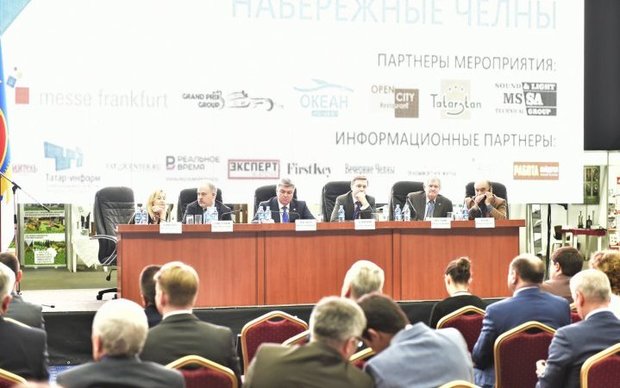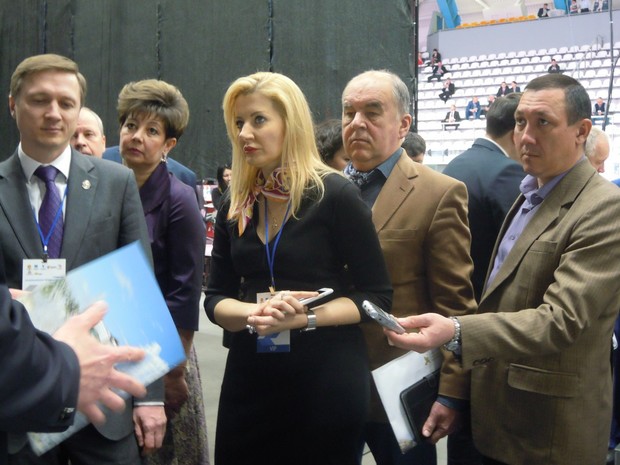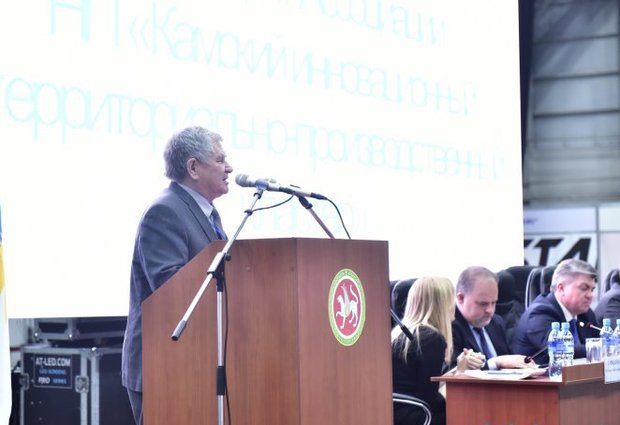Kama Forum 2016: ‘What do 20m rubles mean? It is not enough!’
Tatarstan started an active campaign on attraction of residents to priority development areas of Naberezhnye Chelny
Federal and regional functionaries told how they would support small and mid-sized businesses of Kama cluster and how they would attract investors to priority development areas on 16 March at a sitting of Kama Forum 2016. Shamil Ageyev, in turn, criticized the federal functionaries for a small budget of the Industry Development Fund and large companies for their sneering attitude to small and mid-sized businesses by means of which giants factually buy on credit. The head of Tatinvestneftekhim-holding told off the banking system for its unwillingness to grant credits to industrial projects, the authority for their small steps in import substitution, and secondly, for their closed nature 'like in a prison' that impedes integration in Innokam, in particular.
Rostrum on ice, and where the 3,000 participants disappeared
The plenary sitting of the first day of Kama Innovative and Industrial Forum was held in the building of Ice Palace. The Presidium settled in the centre of the hockey rink, and the participants of the forum sat in the stands. The mayor, the Minister of the Industry of Tatarstan Albert Karimov, a functionary of the Ministry of Economic Development of Tatarstan Pavel Svistunov, the Deputy Minister of Economy of Tatarstan Natalya Tarkaeva and others approached the rostrum one by one. Nail Magdeyev in his welcome speech noticed that the forum had been preserving a status of an effective site for discussion and experience exchange on the implementation of the most modern technologies for 10 years. The mayor of Naberezhnye Chelny told that the purpose of the forum was to support a producer by integration of SMBs around large companies and realization of import substitution programmes and 'discussion of further development of Innokam, which was defined to be the main point of the economic growth of Tatarstan in the course of the next 10 years'. Innokam was included in the number of sectoral clusters that got federal support.
Albert Karimov, who delivered his speech after the mayor, suddenly presented the final figures of Kama Forum, which, unfortunately, did not coincide with the plan: only 2,000 people registered instead of 5,000, 'over 115' companies placed their stands instead of 120. Nevertheless, the Minister was surprised by the exhibition that he saw with the federal guests before the plenary sitting. According to him, the diversity of projects means that the diversification of the economy is in the process. Apart from the help from priority development areas, the Ministry of the Industry of Tatarstan counts on federal support and support of the Industry Development Fund, which was created last year.
The banking system, unfortunately, cannot provide a good interest, which would please a producer, the fund offers interests at 5%. In 2015, the size of the fund was 20bn rubles. This year it increased twofold. Four projects of Tatarstan were really supported. There are instruments concerning Special Investment Contracts designed for big projects. All incentives will be saved while signing these contracts regardless of the changes in the legislation. What is more, tax rates on profit will be reduced for those who signed such contracts. There is a sectoral support of car producers, chemical industry and others that presupposes a subsidization of the tax rate on credit for investment needs and working capital,' Karimov enumerated the measures on support of SMBs by the authority during the crisis.

'Large projects won't come and collect all money'
Pavel Svistunov, the deputy director of the Department Social Development and Innovation of the Ministry of Economic Development of Russia noted that Kama forum was 'important because it had real projects':
'I saw the exhibition, and I liked it. Successful participants of the exhibition or those who have products are potentially ready to conquer the market and clearly know their consumer, and where they might find support. I think that a big part of projects appeared as a result of the synergetic effect of the very cluster,' the functionary presupposed and immediately promised that, 'The programme of Innokam will come into play in the government of Russia this week or another, but it already is in the process.
While the participants of the forum were thinking about why this programme should be adopted if it was in the process, Bulat Salakhov, a representative of the Industry Development Fund, also promised one thing. Having corrected the Minister of the Industry of Tatarstan, he stated that the formats of the support changed 'three days ago', and the very fund 'was moving towards mid-sized business'. 'Large projects won't come and collect all money!'
Tatarstan can choose a half of the budget of the programme of the Industry Development Fund
'We will have four new programmes on support of import-substituting production. Prepayments can be received for leasing projects and support programmes of machine tool building. We will support the projects whose budget is over 100m rubles and that have own funds,' Salakhov warned, 'Some of them came to us without their own funds, took out them from a bank and carried no risks last year. We decided to divide risks since 2016 in order to make every participant feel his or her responsibility.'
Salakhov noted that four projects out of over 70, which were supported in 2015, come from Tatarstan. Speaking about the subsidization of the interest rate on investment loans, Salakhov also noted that 17 victorious projects out of 137 represented Tatarstan.
'Tatarstan projects can choose a half of the budget of the programme this year! I hope it will be enough for Tatarstan,' the functionary calmed Albert Karimov down.

Status of priority development area won't exclude a possibility of use of instruments of financial support of Russia or Tatarstan
Shamil Ageyev, who was irritated by a scandal at the opening of the exhibition of Kama Forum (a small company of KAMAZ blamed that he cheated the enterprise for 15m rubles) inquired the federal functionary's view of solution of the relationships between large business and SMBS. Is it possible that the regional Industry Development Fund will be ready for the financial support of the supplier that large business owes? But Salakhov did not hear any clear answer. The functionary told that his fund was 'federal' and the problem of large and small businesses was everywhere. He stated that 'the heads of companies' should solve this problem with the help of the state apparatus. Salakhov did not tell what kind of support it was.
Natalya Tarkaeva told why the authority would develop Innokam. As it turned out, the volume of the delivered products in Kama cluster was 112%, which is higher than in Russia on average. And the Ministry of Economy thinks that the main growth point of very Innokam is not in Chelny, Nizhnekamsk but Alabuga. Functionaries expect that the quantity of residents is to increase from today's 48 to 120 companies by 2023.
'We would like the entrepreneurs of Chelny, Tatarstan or Russia to actively participate and register their enterprises in the priority development areas,' she stated. 'The status of the priority development area doesn't exclude the possibility of use of the instruments of the financial support of Russia or Tatarstan!'
Tarkaeva also said that KIP Master, where there are 257 enterprises whose turnover was 28,9bn rubles and taxes were 16bn rubles, is the growth point of Chelny.
'We expended 10 times more than the government invested in the creation of this industrial park!' Tarkaeva proudly said. 'If the project of the duplication of the sites of Master is successful, KIP will become the biggest industrial park in Europe.'
'What do 20m rubles mean? It is not enough!'
Nevertheless, she admitted that Chelny had a number of unsolved problems connected with the infrastructure. Traffic capacity is not enough, in particular. The population has more requirements for the quality of the social environment. However, she noted that the concept of Innokam presupposed an improvement of the social sphere and infrastructure of the territory. At present the concept is at approval stage in ministries and authorities (most of them already approved it). Tarkaeva promised that the concept would be adopted by the summer.
'We met with Rustam Minnikhanov recently and discussed the creation of an information letter for invitation of residents to priority development areas. There are offers from Italy, France, and Switzerland [Editor's Note: concrete names of companies were not mentioned]. It is very important for us to bring new technologies here,' Shamil Ageyev agreed with Tarkaeva. 'As for the business climate, 72 speakers agreed with key problems at a recent meeting with Putin. It is a stranglehold of administration barriers. It is an unavailability of money. And here there was a speech from the Industry Fund of Russia. 'What do 20m rubles mean? It is not enough! 400bn rubles more are needed!' he had a dig at Bulat Salakhov. 'But the economic block is afraid as it is afraid of the acceleration of inflation…'

'Assortment of only one company of PSR includes 8,500 articles!'
He dedicated his report to the development of petrochemistry of Tatarstan within the scope of Innokam. He started with figures. In 2015, chemical products at 258bn rubles and rubber and plastic products at 81bn rubles were sold in Tatarstan. But growth rates of these sectors 'suddenly became slower' during the crisis. In 2015, volumes of chemical production increased only by 1,9%, production of rubber goods reduced by 0,9% and plastic products – 'even by 5%'. The share of tyre complex of Tatneft decreased from 31% to 26%. The producers of plastic goods faced a 'sudden price rise in raw material', a deficit of money and reduction of demand. Against this background, the companies turned their faces to western markets, so the export increased by 1%.
'But we don't produce many chemical products: epoxy and polyester resins. Russia doesn't produce all kinds of polyamides. And we say – 'import substitution!', 'now we will produce 300 articles!' But the assortment of only one company of PSR includes 8,500 articles!' Yarullin drew attention to it.
Rafinat Yarullin thinks that privacy of some large companies is a problem
According to him, taking account the falling prices for petroleum and gas, the variants of provision of these raw materials for chemical factories, including processing of natural gas (methane), is considered. He told that use of gas fuel in Chelny was a correct initiative and production of carbamide from natural gas (in Mendeleyevsk) was a breakthrough. As Yarullin supposes, 'priority development areas extremely need' such projects. What is more, the list of top products of chemistry and petrochemistry for import substitution has been approved. And it will be extended up to 64 positions by the beginning of 2016. But…
'It is a very small figure for chemistry and petrochemistry,' the head of Tatneftekhiminvest-holding' admitted sadly. 'It is unknown how are we going to develop our economy then?'
Yarullin criticized the very Russian business, especially the large one, which is closed for an external person. Exchange of information on manufacture of products is carried out in Russia. So what? The exchange is carried out by 'a private chat between a regional authority and separate companies':
'But it is impossible to enter some enterprises! As in a prison! What is good in Chelny is that the mayor meets with businesspeople at 7 o'clock in the morning (Editor's Note: meetings within the scope of Anti-crisis Group). The more contacts between governmental branches and producers, the sooner we can get rid of all these sanctions!' Rafinat Yarullin concluded.